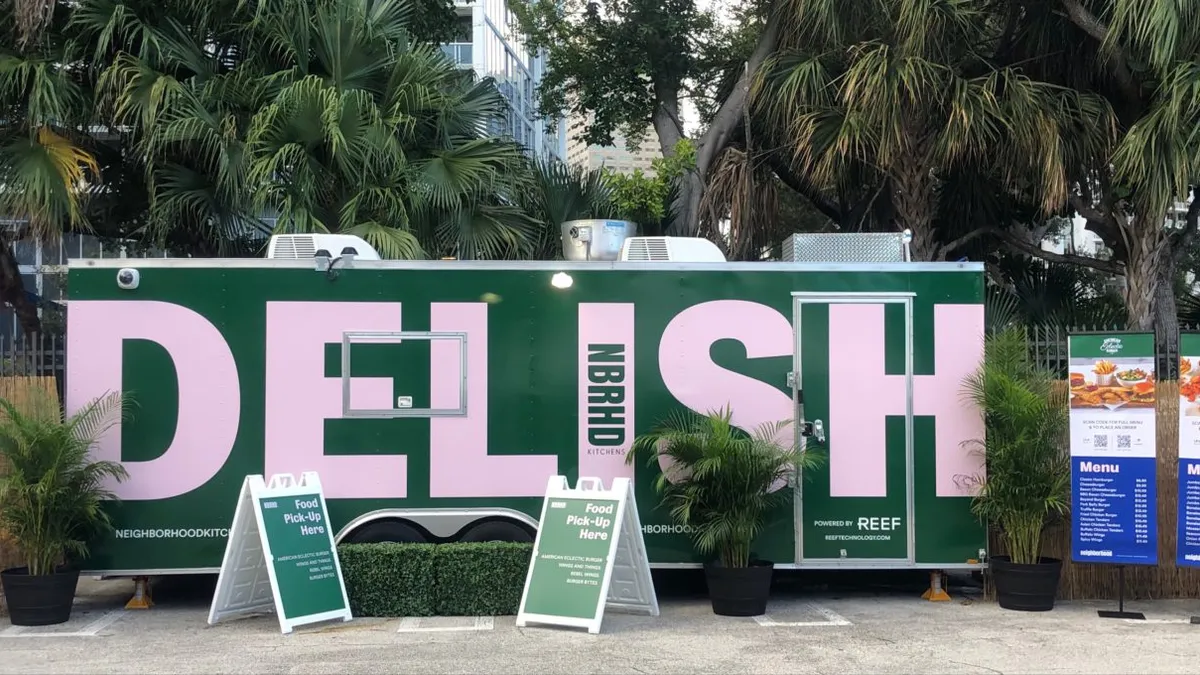UPDATE: Jan. 13, 2022: A Reef spokesperson told Restaurant Dive the temporary unit closures were, in part, necessary to prepare those units for serving food from partner restaurants. Reef declined to specify which restaurant brands would be served from those units, and declined to offer a specific timeline for reopening.
The spokesperson said most of the units that closed served only Reef's in-house virtual brands. The company said Reef's brands act as placeholders in their mobile ghost kitchens until partner brands can be deployed. Reef declined to address questions regarding the performance of the shuttered units or unit economics overall.
Dive Brief:
- Reef is temporarily closing nearly one-third of its 300 mobile ghost kitchen locations, Business Insider reported Tuesday. Reef considers these units to be "underperforming," though the company did not clarify to Business Insider what these metrics entail.
- One day prior, Denny's announced it is partnering with Reef to offer delivery options from ghost kitchens in metropolitan markets where Denny's doesn't have a strong presence. The companies will disclose the test market locations in a future announcement.
- Neither Reef nor Denny's responded to Restaurant Dive's requests for comment on the impact Reef's closures might have on future operations.
Dive Insight:
Reef is continuing its expansion tear despite internal challenges, a pattern that has made headlines due to concern over worker and food safety.
It's unclear if this strategy is bringing the ghost kitchen operator success. In November, the Wall Street Journal reported the average Reef unit was losing about $550 a day. Restaurant Dive's reporting on Reef revealed the company paid higher royalty rates than a standard QSR franchisee in its deal with Wendy's. Wendy's CEO said the higher royalty rates could make up for comparatively low sales out of Reef's portable ghost kitchens.
Reef also lost David Chang's fried chicken concept, Fuku, to rival Kitchen United at the end of last year amid a slew of permitting issues and health shutdowns in multiple states. Still, Denny's appears confident in Reef's potential impact on its business. CEO John Miller said in a statement that Reef would build on the breakfast chain's relative success with other off-premise offerings.
"We have successfully extended the reach of the Denny’s brand through online and delivery channels using our existing network of restaurants," Miller said. "We look forward to reaching even more guests with REEF, particularly in key under-penetrated metropolitan markets with high consumer demand for delivery."
Introducing major brands to under-penetrated urban areas is a key part of Reef's value proposition, Michael Beacham, president of Reef's kitchen operations, told Restaurant Dive in October. At the time, Beacham cited TGI Fridays as an example, but Denny's also fits into this strategy.
Denny's offers Reef a national brand with strong name recognition and an emphasis on a daypart that most of Reef's other major deals — including 800 Degrees Pizza, TGI Fridays and C3 — do not specialize in.
In January 2021, Denny's announced it would begin offering two virtual brands, the Burger Den and the Melt Down, and increase its emphasis on off-premise sales. A major deal with Reef would expand that emphasis, though the press release did not specify how many units Denny's plans to develop with Reef. Last month, Denny's offered free delivery as part of a Matrix-themed promotion, a move intended to strengthen Denny's emphasis on digital ordering and showcase the brand's digital transformation.
Reef continues to grow outside of the U.S., too. Reef, which is backed by a sovereign wealth fund chaired by the crown prince of Abu Dhabi, announced last week that it's partnering with Kuwait-based food and beverage operator Americana to open ghost kitchens throughout the Middle East and North Africa.












